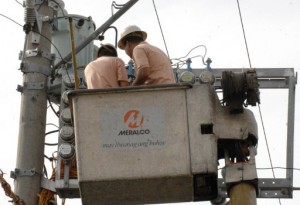
HIGH POWER RATES Linemen from the Manila Electric Company (MERALCO) install electric meters in Manila in this file photo. Because of the high electricity rates in the country, exporters doing business in the Philippines are reportedly looking at moving to China or Vietnam, which both have lower power rates. AFP PHOTO/Jay DIRECTO
Exporters currently holding fort in the Philippines are now looking at moving to China or Vietnam as high electricity rates in the country cause them to lose their competitive edge in the global market.
According to Nora Halili Lao, holiday and gifts sector trustee of Philippine Exporters Confederation Inc., the high cost of power in the country made exporters’ prices too expensive to compete with many of their counterparts, causing them to lose sales.
She said electricity accounted for 40-50 percent of exporters’ total operating expenses. Considering this, it was difficult for exporters from the Philippines to price their products at more competitive levels.
“Producers and manufacturers suffer. They said they are no longer competitive [here], so they go to [other] countries for an ocular inspection to determine if they can compete [from there],” she said in a statement posted on Philexport’s official website.
The countries most favored as alternative locations were Vietnam and China, which both have lower power rates than the Philippines, she said. Some furniture exporters have actually moved to Vietnam and some buying agents have already set up offices there.
Before transferring, however, she said manufacturers and exporters were still conducting ocular inspections and doing their homework in the other locations they were considering.
“They want to compare and know if it is true that electricity is the one killing them. [There are] buyers who do not want to come here because products have become more expensive due to high power cost,” she related.
The Philippine Chamber of Commerce and Industry, in a wish list submitted to President Aquino late last month, sought the crafting of key policies supporting the energy sector, particularly a five-year electric power industry roadmap.
The country’s long-term power sector roadmap would then be based on this medium-term plan, the business group said.
This roadmap should contain solutions to bring electricity rates to more competitive levels, build adequate generation capacity for Luzon, and resolve the Mindanao supply shortfall, PCCI said.


